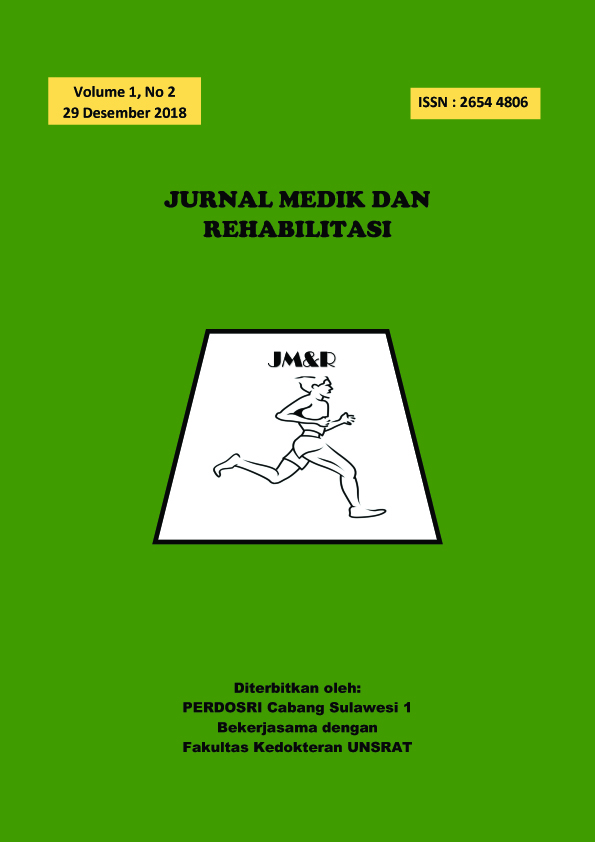HUBUNGAN NILAI INTELLIGENCE QUOTIENT DENGAN INDEKS PRESTASI KUMULATIF SEMESTER SATU SAMPAI ENAM MAHASISWA ANGKATAN 2015 FAKULTAS KEDOKTERAN UNIVERSITAS SAM RATULANGI
Abstract
Abstract: Intelligence is the ability of individuals to think, learn from experience, and adapt to new situations. The Intelligence Quotient (IQ) test is used to measure a person's intelligence in valid and reliable manners. IQ is the result of mental age with chronological age. To assess whether IQ tests are feasible to be used as selection and evaluative tests in providing an overview of the quality of students going forward, both in terms of the Grade Point Average (GPA) or other academic achievements, there is still controversy, because there are several supporting studies and several studies that argue. Therefore, researcher wants to know correlation between IQ and undergraduate GPA scores from last sixth semesters. The type of research used is observational analytic with cross sectional design. The sample used was 95 medical students who met the inclusion criteria. IQ scores are obtained through IST instruments and Semester 1-6 GPA scores are obtained through student Study Results Cards (KHS).Results: There is a significant correlation between IQ scores and undergraduate GPA scores from last sixth semesters (p = 0,000, p <0,05) with moderate correlation (r = 0,425) and positive correlation, the higher the IQ score, the higher the undergraduate GPA scores from last sixth semesters..Conclusion: There is a significant correlation between IQ scores and undergraduate GPA scores from last sixth semesters.
Keywords: GPA,IQ, IST,
Abstrak: Kecerdasan merupakan kemampuan individu untuk bepikir, belajar dari pengalaman, dan beradaptasi terhadap situasi baru. Tes Intelligence Quotient (IQ) digunakan untuk mengukur kecerdasan seseorang secara valid dan andal. IQ merupakan hasil bagi antara usia mental dengan usia kronologis. Untuk menilai apakah tes IQ layak digunakan sebagai tes seleksi maupun evaluatif dalam memberikan gambaran kualitas mahasiswa kedepannya, baik dari segi Indeks Prestasi Kumulatif (IPK) ataupun prestasi akademik lainnya, masih kontroversi, karena ada beberapa penelitian yang mendukung dan membantah. Oleh karena itu, peneliti ingin mengetahui Hubungan IQ dengan IPK Semester 1-6 mahasiswa. Jenis penelitian yang digunakan adalah analitik observasional dengan desain cross sectional. Sampel yang digunakan adalah 95 mahasiswa kedokteran yang memenuhi kriteria inklusi. Nilai IQ diperoleh melalui instrumen IST dan nilai IPK Semester 1-6 diperoleh melalui Kartu Hasil Studi (KHS) mahasiswa. Hasil: Terdapat hubungan yang signifikan antara nilai IQ dengan IPK Semester 1-6 (p=0,000, p<0,05) dengan kekuatan korelasi sedang (r=0,425) dan arah korelasi positif. Kesimpulan: Terdapat hubungan yang signifikan antara nilai IQ dengan IPK Semester 1-6 mahasiswa.
Kata Kunci: IPK, IQ, ISTReferences
Lally M, French SV. Introduction to Psychology. Canada: College of Lake County Foundation, 2018. p:176-212.
Brightone L. Factors Affecting Student Performance in Certificate of Secondary Education Examination in Newala District, Mtwara Region [dissertation]. Tanzania: Open University Of Tanzania; 2017.
Draper SW. A History of Intelligence and Abilities and Aptitudes in Relation to Learning [internet]. Scotland: University of Glasgow, 2015. Available from. URL:http://www.psy.gla.ac.uk/~steve/courses/ceredocs/oldwikis/7.Whatarethemainindividualdifferencesinlearning.pdf.
Imlahi H. Intelligence Quotient and Its Environmental Factors in Children. Al- Akhawayn University, 2015. p.4-8.
Domberg M. Introduction to Psychological Testing: Intelligence Quotient [internet] Helen Farabee Centers, 2018. Available from. URL: https://www.helenfarabee.org/poc/view_doc.php?type=doc&id=8217&cn=18. Accessed August 10, 2018.
Jusuf AA. Pendekatan SPICES dan Problem Based Learning (PBL). Disajikan pada acara pelatihan pendidikan di program pendidikan ilmu komputer STMIK Bidakara, Jakarta 21 Februari 2009.
Reteng P, Wungouw HIS, Polii H. Nilai Intelligence Quotient (IQ) dan Nilai Ujian Modul Mahasiswa Angkatan 2013 Fakultas Kedokteran Universitas Sam Ratulangi [skripsi]. Ejournal UNSRAT. 2014 [Diakses 10 Agustus 2018]. Tersedia di: http://ejournal.unsrat.ac.id/index.php/ebiomedik/article/view/3644.
Montolalu NLHS, Opod H, Pali C. Gambaran Tingkat Inteligensi Mahasiswa Tahun Pertama Program Studi Pendidikan Dokter Fakultas Kedokteran Universitas Sam Ratulangi [skripsi]. Jurnal e-Biomedik (eBm), Volume 4, Nomor 2, Juli-Desember 2016. [Diakses 10 Agustus 2018]. Tersedia di: https://ejournal.unsrat.aculyati.id/index.php/ebiomedik/article/view/14603.
Stevani F. Pengaruh Intelligence Quotient dan Emotional Quotient terhadap Prestasi Belajar Matakuliah Pengantar Akuntansi 1 Mahasiswa Semester III Program Studi Pendidikan Ekonomi IKIP PGRI Bojonegoro Tahun Pelajaran 2015/2016. Jurnal Edutama, Vol.3, No.2 Juli 2016.
Mulyati S. Pengaruh Intelligence Quotient (IQ) , Perhatian Orangtua dan Kedisiplinan Siswa terhadap Prestasi Belajar IPS (Studi di SDN Jatimulyo 3 Kecamatan Lowokwaru Kota Malang). Jurnal Penelitian dan Pendidikan IPS (JPPI) Volume 11 No 2 (2017) 267-280.
Sulistiya F. Pengaruh Tingkat (IQ) dan (EQ) terhadap Prestasi Belajar Penjasorkes Siswa di SMPN 15 Yogyakarta [skripsi]. Yogyakarta: Universitas Negeri Yogyakarta, 2016.
Yesikar V, et.al. Research Article: Intelligence Quotient Analysis and Its Association with Academic Performance of Medical Students. International Journal of Community Medicine and Public Health. 2015 Aug: 2(3);275-281. http://www.ijcmph.com).
Kulkarni SD, Pathak NR, Sharma CS. Academic of School Children with Their Intelligence Quotient. NJIRM. 2010;1(2):12-5.
Habibollah N, Rohani A, Aizan TH, Jamaluddin S. Intelligence and Academic Achievement: An Investigation of Gender Differences. Life Science Journal, Vol 7, No 1, 2010.
UNSRAT. Peraturan Rektor Universitas Sam Ratulangi No: 01/UN12/PP/2013 Tentang Pedoman Penyelenggaraan Akademik di Universitas Sam Ratulangi.
Kaur N, Kaur A, Kaur K. Influence of Intelligence Quotient on the Academic Achievement of Students. Int. J. Adv. Res. 6(8), 541-548.
Weiss V. National IQ Means Transformed from Programme for International Student Assessment (PISA) Scores, and Their Underlying Gene Frequencies.
Zaidi ZF. Gender Differences in Human Brain: A Review. The Open Anatomy Journal, 2010, 2, 37-55.
Haier RJ, Jung RE, Yeo RA, Head K, Alkire MT. The neuroanatomy of general intelligence: Sex matters. NeuroImage. 25 (1): 320–7. doi:10.1016/j.neuroimage.2004.11.019. PMID 15734366.

